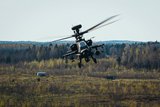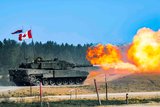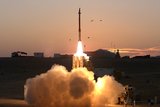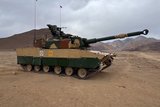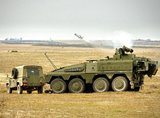Indonesia improves air defence with Skyshield and ForceShield
Beginning in late 2019, the Indonesian Air Force (TNI-AU) will receive a second batch of Oerlikon Skyshield air defence systems from Rheinmetall.
Meanwhile, deliveries of additional Thales ForceShield air defence systems is under way.
This latest contract for these short-range antiaircraft systems was signed in mid-2017, but it was implemented only this year because of delays in funding the acquisition. Rheinmetall announced a $122 million deal on 23 April for an ‘undisclosed Asian nation’ and this is now believed to be Indonesia.
Rheinmetall said it would take three years to complete deliveries.
The TNI-AU earlier received six Skyshield systems in
Already have an account? Log in
Want to keep reading this article?
More from Land Warfare
-
![Canada looking to expedite purchase of armoured fighting vehicle and a new tank]()
Canada looking to expedite purchase of armoured fighting vehicle and a new tank
Canada is improving its Leopard main battle tank fleet but before this is fully completed, it is expected to begin looking for new vehicles.
-
![Layered protection: How air defence is adapting to rising drone and missile threats (podcast)]()
Layered protection: How air defence is adapting to rising drone and missile threats (podcast)
A surge in aerial threats – from advanced missiles to low-cost drones – is reshaping the way militaries approach air defence, driving demand for flexible, multi-layered solutions.
-
![UK agrees parallel development and production process for British Army Challenger 3]()
UK agrees parallel development and production process for British Army Challenger 3
In a bid to accelerate delivery of the British Army’s Challenger 3 main battle tank, which has just carried out its first crewed firings with the latest Rheinmetall 120mm L55A1 smoothbore gun, the UK has opted for an unconventional approach.
-
![Romania intensifies search for more tanks and could look beyond Abrams]()
Romania intensifies search for more tanks and could look beyond Abrams
Since signing a contract to purchase 54 M1A2 Abrams tanks last year, Romania has been looking into options to buy more tanks, but it could cast the net wider than Abrams with funding considerations potentially set to shape the outcome.
-
![Indian Army’s new battle blueprint takes shape]()
Indian Army’s new battle blueprint takes shape
The Indian Army’s modernisation plans reflect the lessons learned from ongoing conflicts and threats as it continues its push for indigenous capabilities.
-
![Portugal set to join Boxer team as it progresses its army transformation]()
Portugal set to join Boxer team as it progresses its army transformation
The Portuguese Army is undergoing an overhaul of its platforms with the latest move towards Boxer 8x8 vehicles marking a major step in reforming and modernising its brigades.









